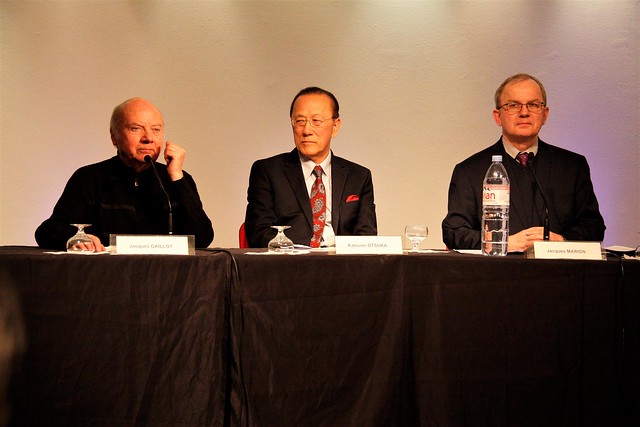Paris, France—More than 100 participants gathered to inaugurate the Interreligious Association for Peace and Development (IAPD), a project of the Universal Peace Federation.
The event, held on January 19, 2019, at the Forum de Grenelle, was sponsored by UPF-France and co-hosted by the French chapters of the Women’s Federation for World Peace, and Youth and Students for Peace, two affiliated organizations, as well as the intergovernmental organization Cercle de réflexion des nations. The theme of the event was “Addressing the Challenges of Our Time: The Contribution of Religion.”
The launch in Paris followed the establishment of IAPD for Europe and the Middle East in Vienna, Austria, in April 2018 and subsequent inaugurations in 2018 at the World Council of Churches in Geneva, Switzerland; in Ukraine, in Israel and in Russia.
After welcoming remarks by Dr. Katsumi Otsuka, the regional chair of UPF for Europe and the Middle East, the keynote address was given by Monsignor Jacques Gaillot, the Catholic bishop of Partenia. With the moral authority of a man dedicated to the defense of the poor and the homeless, the Catholic dignitary referred to current social issues in France and emphasized the need for religious people to recognize and protect the dignity of every individual, including the downtrodden and the migrants.
UPF-France President Jacques Marion then gave an overview of the Principles of Peace taught by the UPF founders, which inspired the 40 years of interreligious work—displayed on banners in the hall—that have been the base for the worldwide launch of IAPD.
The first panel, on the theme “Family, Peace and Human Development,” featured three panelists: Mr. Camel Bechikh, founder of the association Sons of France, which promotes patriotism among young people from an immigrant background; Mrs. Khadija Ait Hammou, a psychologist; and Mrs. Hanna Lotterie, coordinator of the UPF-France project Family and Society.
Mr. Bechikh and Mrs. Ait Hammou, who both are involved with the pro-family movement in the southwestern city of Bordeaux, discussed the historical and ideological background of the decline of family values in France, the consequences on people’s mindsets and the ensuing fragility of family bonds. Mrs. Lotterie gave an overview of the UPF vision for family ethics as the base for a stable society and its relevance for addressing current social issues in today’s France.
The second panel, on the theme “Religious and Political Leaders: Which Forms of Cooperation for Lasting Peace,” was moderated by Mrs. Ye Bonne Maldonado, representing the Women’s Federation for World Peace. It featured five panelists.
Rector Khalil Merroun, rector of the Mosque of Evry, the largest mosque in France, gave his perspective on the Islamic community, some of its challenges and its ultimate integration in the country.
Mr. Michel Thao Chan, the Buddhist president of the Cercle de réflexion des nations, a co-host of the event, described his vision of the harmony between religion and politics and the change of paradigm required to recognize the predominance and permanence of spiritual values in society.
Ms. Lucie Neumann, head of the Interfaith Tour project at the well-known youth “interconvictional” association Coexister, reported on the world tours by young people from different faiths to meet leaders and followers of various religions.
Mr. Jean-François Moulinet, president of the French chapter of the Family Federation for World Peace and Unification, an organization affiliated with UPF, explained about World Scripture, an anthology of sacred texts initiated by UPF founder Reverend Moon in 1985 and published in 1991, to which prominent religious leaders and scholars from all religions contributed.
Finally, Dr. Dominique Kounkou, a lawyer and sociologist of religion, spoke about the 1905 law regulating the separation of church and state in France, which the government plans to revise in order to adapt to the current situation of the Islamic community in the country.
The event concluded with a beautiful and solemn Peace Ceremony. With sacred music in the background, prayers from different faiths were read from the pulpit; then 14 participants, men and women from various religious traditions, came to stand on stage. Seven of them lit seven candles from a central candle, symbolizing the common origin of religious truth and love. The other seven participants each poured water into one container, symbolizing the ultimate merging of religious streams into one river and ocean.
After a minute of silence and meditation, the IAPD Declaration was read and approved by the participants, bringing the event to an end. Each participant could then sign the resolution poster displayed in the hall.
During the discussion, one prominent participant, Paris-based Orthodox Bishop Monsignor Nicolas, commented on his experience in interreligious circles, emphasizing the need for communication of heart and a listening attitude to transcend religious barriers. Participants echoed his concern, and several testified that the IAPD inaugural event had just accomplished this requirement.


